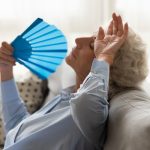Just a few days ago we talked about the dangers of polypharmacy – taking five or more medications on a regular basis.
As a quick follow-up to that, I want to alert you about how high summer temperatures – which are affecting most of the U.S. right now – can influence the way certain medications work in the body.
You see, some commonly used medications can make you more susceptible to heat-related illness. They disrupt the regulation of your body’s core temperature; something known as thermoregulation.
In particular, diuretics, especially when combined with an ACE inhibitor, can contribute to dehydration and heat-related health issues. Out of all medications, this combination has the highest risk.
But other medications like anticoagulants, cardiovascular medicines, NSAIDs, antipsychotics, antidepressants and anticholinergics can all mess with your body’s ability to regulate core temperature.
Many meds also impair your body’s ability to sweat, reduce your ability to know when you are thirsty and affect electrolyte imbalance. When you combine these side effects with a hot summer day, it can be deadly.
In the meantime, the soaring summer temperatures can also have a profound effect on the very conditions that you are taking these medications for.
Other Ways Hot Summer Days Affect Your Health
By far, cardiovascular events are the primary cause of deaths during a heat wave. More older adults die from cardiovascular events during heat extremes than nearly all other heat-related causes combined.
It has to do with how blood flow works when the body becomes overheated. The body redirects blood to the skin to help release body heat. Your heart has to pump faster and harder to keep up. This puts a strain on your heart.
At the same time, if you become dehydrated it decreases your blood volume. This means your heart has to work even harder, increasing the burden even further. This could reduce blood flow and prevent your heart or brain from getting enough oxygen.
If you already have cardiovascular disease, this can increase your risk of a heart attack or stroke, especially if you’re an older adult. And the heat can affect your chances of either of these events up to a week later.
People with respiratory conditions are also highly affected by extreme summer heat. In fact, it’s estimated that every 10-degree increase in average daily temperatures is associated with a 4.3% increase in emergency hospitalizations for respiratory diseases.
In COPD, your body uses a lot of energy just to breathe. When all of that energy has to be rerouted to lower your body temperature, it can make breathing more difficult. And with asthma, when it’s extremely hot outside, the air around you doesn’t move very much. It becomes stagnant. This can trigger a flare-up.
Higher temperatures can also mess with your mind. ER visits for mental disorders increase even with short-term exposure to extreme heat. This includes things like anxiety disorders, mood disorders, schizophrenia and dementia.
One study out of Brisbane, Australia found that hospitalizations due to Alzheimer’s increased by 51% during mid-intensity heat waves. And some research finds that the risk for dementia-associated hospitalizations is greater in regions that have wider temperature variations. So dementia patients experiencing extreme heat in the northern states may be at higher risk than those who live in the south.
How to Cool Down on a Sweltering Day
Drink plenty of water, even if you don’t feel thirsty. Extremely high temperatures will suck the moisture right out of you. Keep yourself hydrated! If heading outdoors, carry extra water in a fanny or backpack cooler.
Eat for the heat. Foods that are salty, sugary or fried are some of the worst foods to eat during a heat wave. Instead, zero in on hydrating foods like leafy greens, cucumbers, celery, avocados and fresh fruits. Not only are they better for you in a heat wave, they don’t require turning on the stove or oven and making things even hotter.
To cool down, a couple of cool, wet cloths can work magic, so keep a few on hand. You can wrap them around your neck, wrists, elbows or ankles – and place them on your groin – to help cool you down. Sink into a tub of cool water or take a cold shower during the hottest part of the day for a full body cool-down.
Better yet, go someplace cool like the mall, movies or museum. If you like to read, which is one of my favorite sports when it’s too hot to do anything else, head to the library. Or go to Barnes and Noble to relax and read in their café.
If you have outdoor plans on a hot summer day, try to limit them to the morning or evening when the temperatures are a little lower and find a shady spot to settle down in. I also like to take along a spray bottle filled with cold water and ice cubes. Whenever I’m feeling over heated, I just give myself a cooling spray.
Most importantly! Never leave any living being inside a parked car, even if the windows are cracked open and you are parked in the shade. If it’s 90 degrees outside, it will reach 120 inside the car in only 20 minutes. If it’s 100 outside, the temperature inside a locked car can reach 150 degrees. That’s deadly.
SOURCES:
Westaway K, Frank O, Husband A, McClure A, Shute R, Edwards S, Curtis J, Rowett D. Medicines can affect thermoregulation and accentuate the risk of dehydration and heat-related illness during hot weather. J Clin Pharm Ther. 2015 Aug;40(4):363-7.
Heat and Medications – Guidance for Clinicians. National Center for Environmental Health (NCEH). Last updated Apr 2024.
Kalisch Ellett LM, Pratt NL, Le Blanc VT, Westaway K, Roughead EE. Increased risk of hospital admission for dehydration or heat-related illness after initiation of medicines: a sequence symmetry analysis. J Clin Pharm Ther. 2016 Oct;41(5):503-7.
Liu J, Varghese BM, Hansen A, Zhang Y, Driscoll T, et al. Heat exposure and cardiovascular health outcomes: a systematic review and meta-analysis. The Lancet. Jun 2022;6(6):E484-E495.
Anderson GB, Dominici F, Wang Y, McCormack MC, Bell ML, Peng RD. Heat-related emergency hospitalizations for respiratory diseases in the Medicare population. Am J Respir Crit Care Med. 2013;187(10):1098-1103.
Yoo EH, Eum Y, Roberts JE, Gao Q, Chen K. Association between extreme temperatures and emergency room visits related to mental disorders: A multi-region time-series study in New York, USA. Sci Total Environ. 2021 Oct 20;792:148246.
Xu Z, Tong S, Cheng J, Zhang Y, Wang N, Zhang Y, Hayixibayi A, Hu W. Heatwaves, hospitalizations for Alzheimer’s disease, and postdischarge deaths: A population-based cohort study. Environ Res. 2019 Nov;178:108714.
Wei Y, Wang Y, Lin CK, Yin K, Yang J, Shi L, Li L, Zanobetti A, Schwartz JD. Associations between seasonal temperature and dementia-associated hospitalizations in New England. Environ Int. 2019 May;126:228-233.






